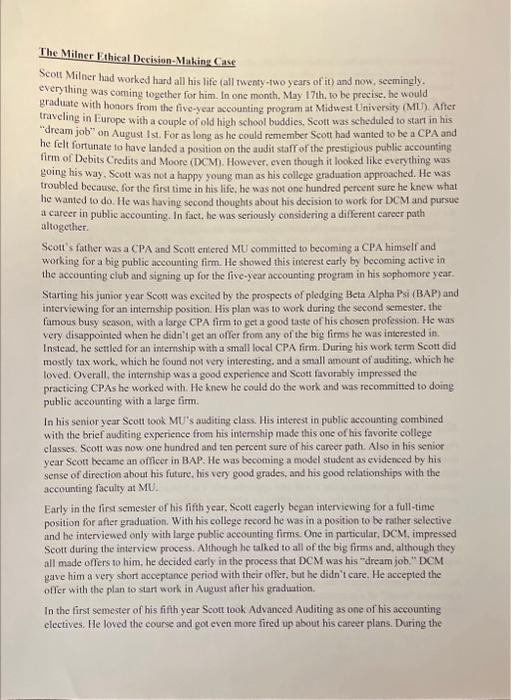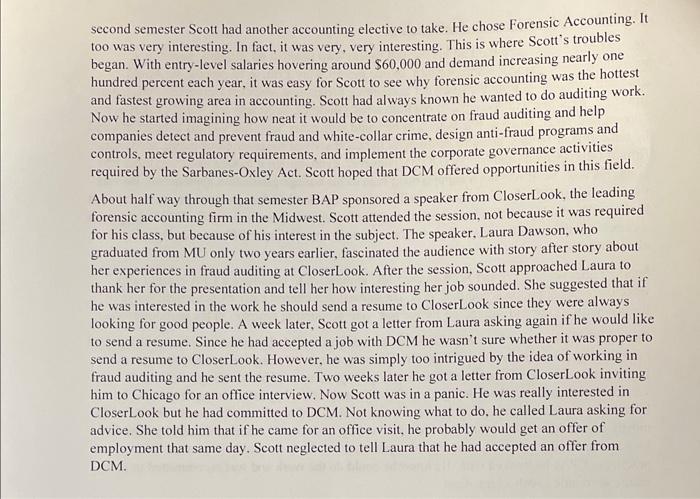Answered step by step
Verified Expert Solution
Question
1 Approved Answer
What are the key facts of this story? Who are the stakeholders in this case? The Milner Ethical Decision-Making Case Scott Milner had worked hard
What are the key facts of this story? 

Who are the stakeholders in this case?


The Milner Ethical Decision-Making Case
Scott Milner had worked hard all his life (all twenty-two years of it) and now, seemingly,
everything was coming together for him. In one month, May 17th, to be precise, he would
graduate with honors from the five-year accounting program at Midwest University (MU). After
traveling in Europe with a couple of old high school buddies, Scott was scheduled to start in his
dream job on August 1st. For as long as he could remember Scott had wanted to be a CPA and
he felt fortunate to have landed a position on the audit staff of the prestigious public accounting
firm of Debits Credits and Moore (DCM). However, even though it looked like everything was
going his way, Scott was not a happy young man as his college graduation approached. He was
troubled because, for the first time in his life, he was not one hundred percent sure he knew what
he wanted to do. He was having second thoughts about his decision to work for DCM and pursue
a career in public accounting. In fact, he was seriously considering a different career path
altogether.
Scotts father was a CPA and Scott entered MU committed to becoming a CPA himself and
working for a big public accounting firm. He showed this interest early by becoming active in
the accounting club and signing up for the five-year accounting program in his sophomore year.
Starting his junior year Scott was excited by the prospects of pledging Beta Alpha Psi (BAP) and
interviewing for an internship position. His plan was to work during the second semester, the
famous busy season, with a large CPA firm to get a good taste of his chosen profession. He was
very disappointed when he didnt get an offer from any of the big firms he was interested in.
Instead, he settled for an internship with a small local CPA firm. During his work term Scott did
mostly tax work, which he found not very interesting, and a small amount of auditing, which he
loved. Overall, the internship was a good experience and Scott favorably impressed the
practicing CPAs he worked with. He knew he could do the work and was recommitted to doing
public accounting with a large firm.
In his senior year Scott took MUs auditing class. His interest in public accounting combined
with the brief auditing experience from his internship made this one of his favorite college
classes. Scott was now one hundred and ten percent sure of his career path. Also in his senior
year Scott became an officer in BAP. He was becoming a model student as evidenced by his
sense of direction about his future, his very good grades, and his good relationships with the
accounting faculty at MU.
Early in the first semester of his fifth year, Scott eagerly began interviewing for a full-time
position for after graduation. With his college record he was in a position to be rather selective
and he interviewed only with large public accounting firms. One in particular, DCM, impressed
Scott during the interview process. Although he talked to all of the big firms and, although they
all made offers to him, he decided early in the process that DCM was his dream job. DCM
gave him a very short acceptance period with their offer, but he didnt care. He accepted the
offer with the plan to start work in August after his graduation.
In the first semester of his fifth year Scott took Advanced Auditing as one of his accounting
electives. He loved the course and got even more fired up about his career plans. During the second semester Scott had another accounting elective to take. He chose Forensic Accounting. It
too was very interesting. In fact, it was very, very interesting. This is where Scotts troubles
began. With entry-level salaries hovering around $60,000 and demand increasing nearly one
hundred percent each year, it was easy for Scott to see why forensic accounting was the hottest
and fastest growing area in accounting. Scott had always known he wanted to do auditing work.
Now he started imagining how neat it would be to concentrate on fraud auditing and help
companies detect and prevent fraud and white-collar crime, design anti-fraud programs and
controls, meet regulatory requirements, and implement the corporate governance activities
required by the Sarbanes-Oxley Act. Scott hoped that DCM offered opportunities in this field.
About half way through that semester BAP sponsored a speaker from CloserLook, the leading
forensic accounting firm in the Midwest. Scott attended the session, not because it was required
for his class, but because of his interest in the subject. The speaker, Laura Dawson, who
graduated from MU only two years earlier, fascinated the audience with story after story about
her experiences in fraud auditing at CloserLook. After the session, Scott approached Laura to
thank her for the presentation and tell her how interesting her job sounded. She suggested that if
he was interested in the work he should send a resume to CloserLook since they were always
looking for good people. A week later, Scott got a letter from Laura asking again if he would like
to send a resume. Since he had accepted a job with DCM he wasnt sure whether it was proper to
send a resume to CloserLook. However, he was simply too intrigued by the idea of working in
fraud auditing and he sent the resume. Two weeks later he got a letter from CloserLook inviting
him to Chicago for an office interview. Now Scott was in a panic. He was really interested in
CloserLook but he had committed to DCM. Not knowing what to do, he called Laura asking for
advice. She told him that if he came for an office visit, he probably would get an offer of
employment that same day. Scott neglected to tell Laura that he had accepted an offer from
DCM.
Step by Step Solution
There are 3 Steps involved in it
Step: 1

Get Instant Access to Expert-Tailored Solutions
See step-by-step solutions with expert insights and AI powered tools for academic success
Step: 2

Step: 3

Ace Your Homework with AI
Get the answers you need in no time with our AI-driven, step-by-step assistance
Get Started


